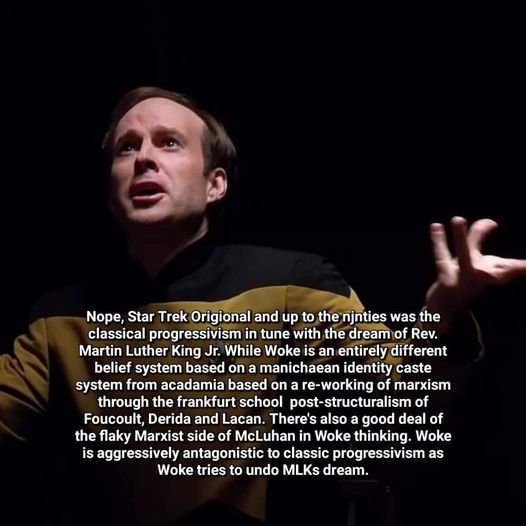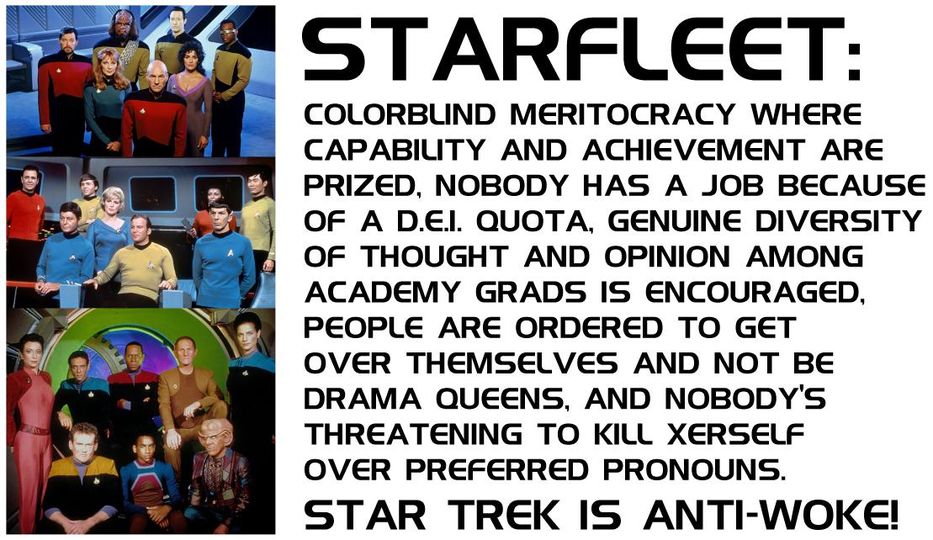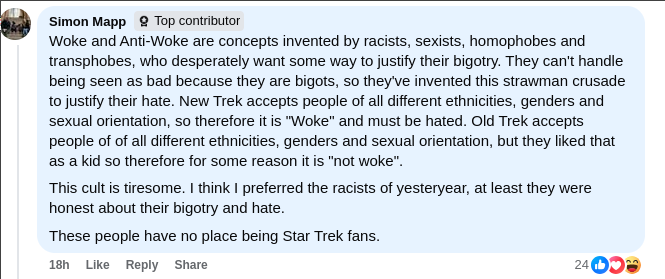Star Trek


Star Trek is an American science fiction media franchise created by Gene Roddenberry, which began with the series of the same name and became a worldwide pop-culture phenomenon. Since its creation, the franchise has expanded into various films, television series, video games, novels, and comic books, and it has become one of the most recognizable and highest-grossing media franchises of all time.
The franchise began with Star Trek (The Original Series), which premiered on September 6, 1966, on Canada's CTV network. In the US it debuted on September 8, 1966, on NBC. The series followed the voyages of the crew of the starship USS Enterprise, a space exploration vessel built by the United Federation of Planets in the 23rd century, on a mission "to explore strange new worlds, to seek out new life and new civilizations, to boldly go where no man has gone before". In creating Star Trek, Roddenberry was inspired by C. S. Forester's Horatio Hornblower series of novels, Jonathan Swift's 1726 novel Gulliver's Travels, the 1956 film Forbidden Planet, and television westerns such as Wagon Train.
The Star Trek canon includes the Original Series, 11 spin-off television series, and a film franchise; further adaptations also exist in several media. After the conclusion of the Original Series, the adventures of its characters continued in The Animated Series, and six feature films. A television revival beginning in the late 1980s and concluding in the mid 2000s saw four spinoff series: The Next Generation, following the crew of a new starship Enterprise a century after the original series; Deep Space Nine and Voyager, set in the same era as the Next Generation; and Enterprise, set a century before the original series in the early days of human interstellar travel. The adventures of the Next Generation crew continued in four additional feature films.
In 2009, the film franchise underwent a reboot, creating an alternate continuity known as the Kelvin timeline; three films have been set in this continuity.
The newest Star Trek television revival, beginning in 2017 was originally thought to be set in the original continuity but as of December 2024 it has been established that this isn't the case. This continuity includes the series Picard, Discovery, Short Treks, Lower Decks, Prodigy, and Strange New Worlds, streaming on digital platforms.
Star Trek has been a cult phenomenon for decades. Fans of the franchise are called "Trekkies" or "Trekkers". The franchise spans a wide range of spin-offs including games, figurines, novels, toys, and comics. From 1998 to 2008, there was a Star Trek–themed attraction in Las Vegas. At least two museum exhibits of props travel the world. The constructed language Klingon was created for the franchise. Several Star Trek parodies have been made, and viewers have produced several fan productions.
Star Trek is noted for its cultural influence beyond works of science fiction. The franchise is also notable for its progressive stances on civil rights.[7] The Original Series included one of the first multiracial casts on US television.
https://www.youtube.com/watch?v=FPSh-V4tedI
https://youtube.com/watch?v=l5MLUWMD1HM
A proponent of New Trek passing judgement over others.
Majel Barrett
https://www.youtube.com/watch?v=DWUmZy9nCSU&lc=Ugz4AD7Zmbpm8cRZ4Y14AaABAg.9UwxwYxmZML9V1x1xYtxHG
Post-Scarcity
The Federation, at least in its core worlds is post-scarce. Commentators often claim that this represents socialism or even communism but it doesn't.
Post scarcity is not Socialist or Communist because socialism and communism both involve redistribution of wealth and this is unnecessary in a post-scarce society. The redistribution of wealth is post-scarce society wouldn't even be meaningful. In a post-scarce society everyone has as much as they need. If wealth was redistributed in a manner which resulted in individuals or groups no longer having as much as they need then the society would no longer be post-scarce by definition.
Star Trek is a draft article and may contain little or no information on the topic but notes are available below.
This article will not be published on A Voice for Men or appear in random article selections. Wiki4Men is looking for trustworthy editors that can turn draft articles in to featured articles. Information on how to apply is on the Main Page.
In lieu of the article, the following is provided:
General Information
The main purpose of Wiki4Men is to provide a repository for information, studies, and research on men and boys and the broad range of issues affecting them, without feminist, misandric, gynocentric or woke bias. Wiki4Men also discusses issues of interest to MRAs, documents the evolution of the men's rights movement itself & misandry for posterity, and discusses issues of identity politics beyond the sphere of gender. The primary audience for Wiki4Men is MRAs, supporters of men's rights and the genuinely curious.
Starting in November 2023 topics that are more likely to be of interest to men are being added to the wiki.
The table below provides information on the number of articles in Wiki4Men.
| Category | Number |
|---|---|
| Biographies | 4,914 |
| Featured | 1,632 |
| Glossary | 487 |
| Unknown Persons | 280 |
| Information Technology | 43 |
| Draft Articles | 5,894 |
Featured articles may appear on A Voice for Men or other sites.
Wiki4Men is brought to you by A Voice for Men. More information on the wiki itself is available here. The Managing Editor is Robert Brockway.
In order to use the site, search for a term that interests you, choose from our Featured Articles or try a random article.
This site encourages publication of factual information about men and women and the cultural contexts in which they meet. It aims to be the keeper of rational and evidence-based conclusions, while rejecting popular forms of gender bigotry.
Due to licence compatibility articles may be imported from Wikipedia with appropriate attribution. These articles can then be corrected for woke bias and other problems. Generally only selected sections of articles are imported from Wikipedia as many Wikipedia articles are now so long that they obscure important information.
Wiki4Men rejects gynocentric and misandric narratives.
